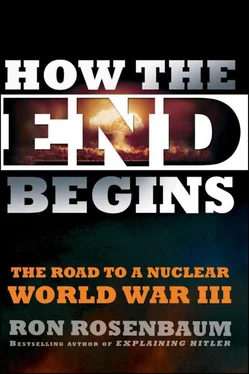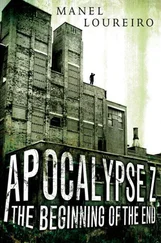Gardiner had more chilling stories from his days as a NATO war gamer. “There was always a two-man team attached to every firing unit. Everyone had one American. I was technically executive officer to a German colonel who outranked me but there was an informal, unspoken rule that no German would be allowed to launch on his own authority.”
No German… Unspoken was the implication that no German, however democratically inclined, would be permitted to be in a position to perpetrate on his own authority what would amount to, in body count, a holocaust. A reminder that any study of nuclear war is a study of genocide, that any given missile launch in the Cold War tinderbox of Central Europe bristling with short-range and long-range nuclear weapons could touch off slaughter on a scale beyond anything Hitler was able to accomplish. Not the same kind of slaughter that singled out a religious ethnic group, but in sheer magnitude a number of dead far beyond Hitler’s imagination. No German…
It raised the question of whether such slaughter, even if carried in a “good cause” for the “good guy” democracies, could be justified. Gardiner has a book on his shelf at home, he says, that used to be required reading for all those involved in targeting and release (launch) exercises. It was a book that detailed the casualties any given nuclear weapons or combinations thereof could cause, depending on mega-tonnage, population density, blast height, and so forth. It was used to calculate what percent of a given blast damage would eliminate military-industrial infrastructure and how many civilian deaths that would necessarily entail.
“It used to be required reading,” Gardiner told me. “It isn’t anymore.”
It was in this context that Colonel Gardiner made, in an almost offhand way, before we even began to war-game the Enigmatic Box on the Euphrates, a stunning allusion to an overlooked aspect of the Georgia crisis of August 2008, which had just then come to an uneasy, unstable pause. Gardiner pointed to a moment in the Georgia military conflict with the Russian Federation in August 2008, maneuvering that suggested we had already passed through the first—virtual but serious—superpower nuclear skirmish of the new nuclear age.
“Did you notice,” Gardiner asked me, “a reference by [Bush National Security Adviser Stephen] Hadley to the fact that in the midst of the fighting in Georgia the Russians had drawn up SS-26s to the battle front?” [274]
SS-26, he explained, is the NATO designation for what the Russians call the Iskander missile, a mobile short- to medium-range ballistic missile launcher system that—and this is the crucial point—is capable of being equipped with either conventional or nuclear warheads. [275]
“Hadley gave this briefing when Bush was in Beijing for the Olympics and the Russians were rolling into Georgia and the Georgians were calling on us to back them up,” Gardiner told me.
“And the point is not just that Hadley said they were moving nukes to the front, the point is the ambiguity—we didn’t know whether these SS-26s were nuclear-tipped or not, and they knew we didn’t know, so in fact, any strategist on our side would have to make the conservative assumption that any countermove we made could be initiating nuclear combat.”
Which means?
“Which means that this may well have been the first instance of nuclear deterrence between the superpowers in the post–Cold War era. Not that we backed down necessarily, because we may well have had no plans to back the Georgians with military power, but the Russians couldn’t have known that for sure, and what they saw—at least one interpretation they could put on it—was ‘SS-26s move up, U.S. backs down.’ Deterrence!”
He—and others—have said nuclear deterrence came into play more than once between the U.S. and other nonnuclear powers. The most specific: the First Gulf War. Kristensen of the Federation of American Scientists has pointed to a moment in the run-up to the U.S. invasion of Iraq in 1991 in which Secretary of State James Baker handed a letter to Tariq Aziz, Saddam Hussein’s henchman. [276]
According to a background briefing by a Pentagon official in 2002: “He [Hussein] didn’t cross the line of using chemical or biological weapons [against U.S. troops]. The Iraqis have told us that they interpreted that letter as meaning that the United States would use nuclear weapons [if he did], and it was a powerful deterrent.”
But this was a threat to use nukes against a nonnuclear power. What Gardiner was saying was that the movement of the SS-26s, ambiguous as it might have been, was a different story; one nuclear superpower making a chess move against another to deter it from coming to the aid of a quasi-client state.
Was the U.S. then deterred? Was this the first instance of post–Cold War nuclear deterrence in operation as Colonel Gardiner suggested? One way of looking at it is that the U.S. wasn’t deterred because the U.S. had no plans to come to the military aid of Georgia however much Georgia might have imagined such might be the case.
I presented Colonel Gardiner’s SS-26 analysis to a smart nuclear deterrence theorist, Elbridge “Bridge” Colby, the grandson of the legendary CIA head William Egan Colby, whom the State Department under Obama had hired to work on the START treaty as part of a team of negotiators.
This was his reply:
“I played no role in that crisis, so am totally an outside observer. My sense is that nuclear weapons played no role other than as they always do in U.S.–Russia relations—as an omnipresent sobering backdrop. I would speculate (again, no inside information) that there was no serious—if any at all—consideration of air operations on behalf of the Georgians not because of the SS-26s but because the U.S. did not even want to consider getting in a shooting war with the Russians over such a peripheral interest.” [277]
All pro forma nonalarmist so far. But I found Colby’s addendum alarming:
“This caution was likely compounded by the knowledge that the Russians have quite publicly and deliberately lowered their nuclear threshold over the last fifteen years, have retained substantial nonstrategic nuclear forces, and have developed doctrine to employ such weapons in their near-abroad [meaning the former soviet states or satellite nations]. U.S. decision makers [one would hope!] took this into account. My guess is that Hadley mentioned the SS-26s, then, simply to highlight alleged Russian irresponsibility in the matter, specifically the willingness to employ potentially nuclear-capable forces in the conflict.”
In other words Colby comes around to concurring with Gardiner: this taking into account the potential presence of Russian nukes—and our recognition of the Russian lowering their nuclear threshold—is one reason for our lack of interest in fighting over Georgia. This could also be called being deterred by nukes. “Caution… compounded” is another way of saying “deterred.”
Colby also raises the interesting question of why Hadley made public the SS-26 chess move. If he went public to the highlight Russian irresponsibility, then for whom was that message intended: not to Putin and Medvedev but rather, perhaps, to the rest of the world’s leadership, to let them know the Russians were playing with fire.
Or it could have been a message to the European Union whose purpose could have been twofold: to make them aware of the urgency and the stakes in the confrontation and encourage them to use whatever leverage they had with the Russian leadership to hold back from the risk, however small, of touching off a wider war.
It could simultaneously have been a message to the military establishment in the U.S. and those in Congress with budgetary power that nuclear weapons of all sizes still play a role now and that we had better be prepared for them to play a role in the future. The downside of this is that, in view of the fact that we did not hurl anything at the Russians but words, it could be taken as an admission that nuclear weapons had deterred us from coming to the aid of Georgia. (Another reason why we were lucky—it was a close call—that Georgia’s application to join NATO, which would have required us to confront the Russians had their admission been complete and accepted, had not been completed at the time of the crisis.)
Читать дальше











